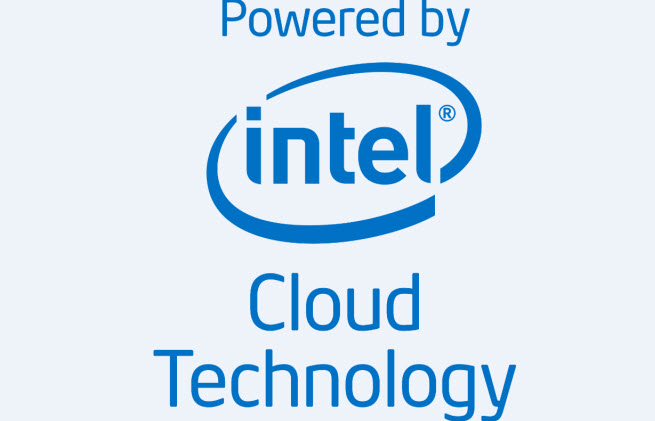Intel has pretty much dominated cloud computing in web-connected data centers for some time. But it’s getting more competition or is about to, and the world’s largest chip maker is responding with an “Intel Inside” style campaign for the cloud.
Santa Clara, Calif.-based Intel is announcing today its “Powered by Intel Cloud Technology” badge for cloud service providers. Sixteen of these companies have agreed to participate in the program by identifying the underlying technology that powers their cloud instances.
So when a young startup approaches a cloud service provider, it will be able to access detailed information about the kind of cloud service it will receive, including who is providing the chips for the servers being used.
The program will benefit Intel because it can argue that it has the best offerings for the cloud. But Intel’s Jason Waxman, vice president and general manager of the data center group, said in an interview with VentureBeat that cloud service providers will also benefit because they will be able to more easily communicate the differentiation they offer in services.
Customers, meanwhile, will be able to choose their infrastructure-as-a-service in a more informed way based on information about performance, reliability, and security. It’s not unlike knowing what kind of engine you’re getting when you buy a car, Waxman said.
“This is about making things more transparent to the user,” Waxman said. “We have heard for a while there is a sea of services for the cloud out there. Which ones will meet a customer’s needs?”
As part of the program, Intel has launched the Intel Cloud Finder online search engine. It allows customers to find cloud service providers that provide technologies based on required criteria. Potential customers can try the services for free before purchase. The providers give answers to 80 detailed questions about what they offer, so customers can tell at a glance if they’ve found a good fit.
Patrick Moorhead, an analyst at Moor Insights & Strategy, said, “Intel for the past few years had free rein in the cloud-based service providers, where they enjoy at least 95 percent market share in server processors like Xeon. Two things are changing, though, and small core workloads are becoming more viable when spread across a massive data center, and Intel will have upcoming competition from the likes of AMD, APM, Broadcom, and Cavium.”
He added, “Intel’s new program provides separation between Atom and Xeon, but also creates a new barrier for its competitors. Essentially, Intel’s program is ‘de-anonymizing’ cloud services and bringing the underlying technology into the light, which historically hid the underlying performance.”
Infrastructure-as-a-service revenue is expected to increase 41 percent annually through 2016, according to market researcher IDC. With more companies considering outsourcing their information technology services, the technology matters more than ever, Waxman said.
The new Intel Cloud Technology program builds on a collaboration announced in September between Amazon Web Services and Intel to communicate to customers the specifications, performance, quality, and security benefits of the Intel technology used in AWS instances. Customers want to know what they’re getting because some services are subpar, and sometimes providers pull bait-and-switches.
In fact, a heterogeneous cloud infrastructure environment — with a lot of different kinds of servers from different vendors — may result in a 40 percent 60 percent variation in performance, according to a recent research paper. If customers get insight into cost trade-offs, they can make better decisions about what they need and what they will pay extra for, like security.
“The key to unlocking flexibility, productivity, and cost trade-offs when using the public cloud is choosing a quality provider with platform performance and capabilities that meet our specific needs,” said Don Whittington, chief information officer of Florida Crystals (owner of Domino Sugar and C&H Sugar). “With our CSP Virtustream participating in Intel Cloud Technology program, we are now aware of the underlying hardware powering the services we buy, and we can make better choices to ensure we have the optimal workload performance for our investment.”
The cloud providers participating in the program are: Virtustream (U.S.); Canopy, an ATOS company (U.K.); Cloud4com (Czech Republic); CloudWatt (France), Expedient (U.S.); KIO Networks (Mexico); KT (Korea); LocaWeb (Brazil); NxtGen (India); Online.net (France); OVH (France); Rackspace (U.S.); Savvis, a company of CenturyLink (US); Selectel (Russia); and UOLhost* (Brazil) have committed to participating in the program. One participant opted not to be named. These companies are responsible for $3 billion in cloud service revenues.
Intel said that seconds matter to companies that depend on cloud technology. Shopzilla, an e-commerce firm, increased its revenue by up to 12 percent by accelerating its page load times from seven seconds to two seconds.
“The cloud has a direct impact on performance of the company,” Waxman said. “A lot of infrastructure marketing has been to guarantee you a core or memory. But they don’t say what kind of core or memory or the speed.”
Charles King, analyst at Pund-IT, said that cloud offerings often deliver “your mileage may vary” performance that risks “injured feelings, dashed expectations, and disgruntled customers.” He said the Intel program is important because mixing and matching cloud components is no easy task.
Peter Ffoulkes, research director for cloud related tech at TheInfoPro, a market researcher, said that transparency and visibility into the cloud is one of the biggest challenges of public cloud usage in his user surveys. He said the program will enable providers to offer varying levels of services and set prices accordingly.
Savvis, one of the participating could providers, likes the Intel program’s transparency. “This program is a natural extension” of an earlier partnership, said Jonathan King, vice president of cloud strategy and business development. “It gives mutual customers the opportunity to better understand the underlying technology features of our platform and enables them to identify the right provider to suit workload requirements.”
VentureBeat's mission is to be a digital town square for technical decision-makers to gain knowledge about transformative enterprise technology and transact. Learn More



